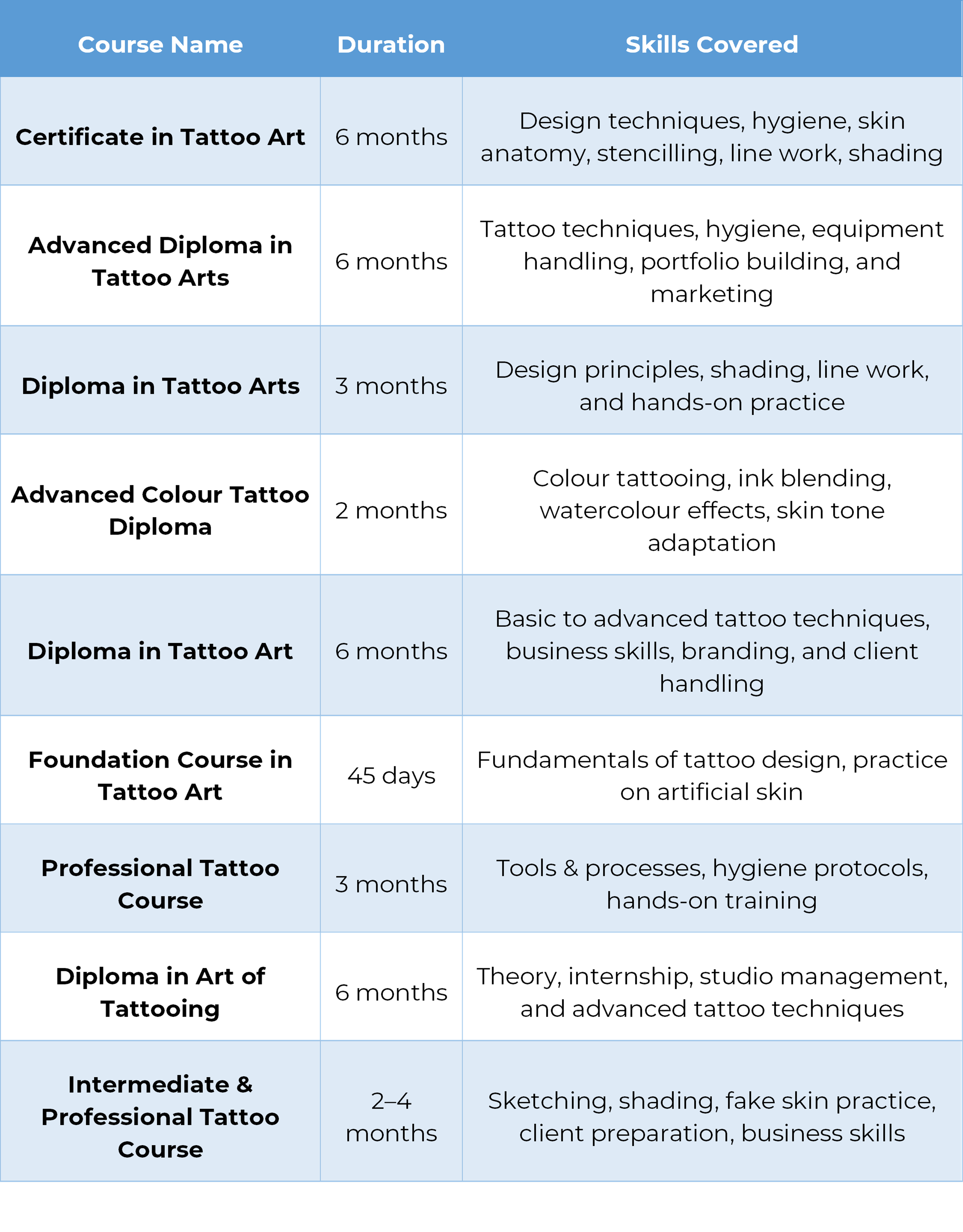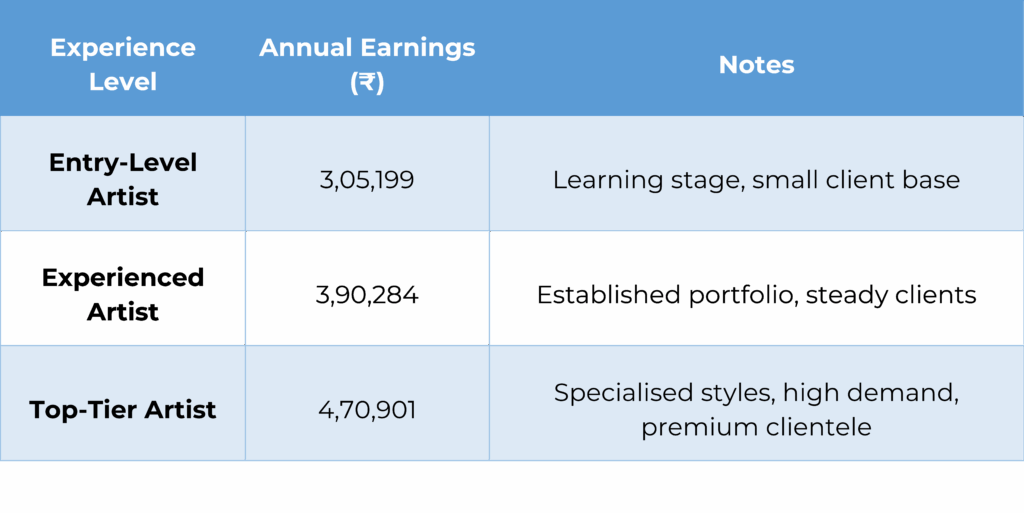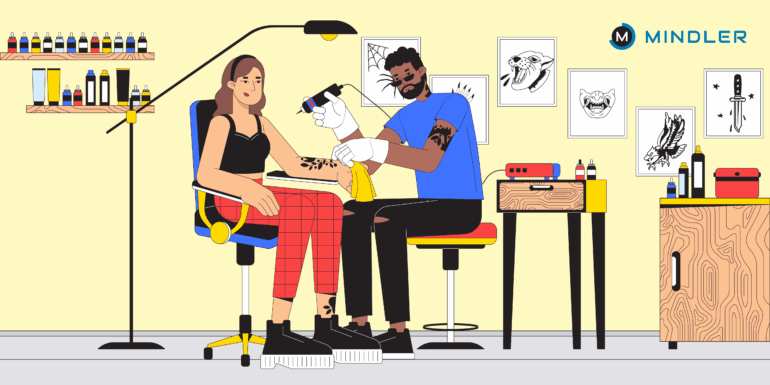Once dismissed as rebellious markings worn by sailors and outcasts, tattoos have evolved into respected art forms embraced by people from all walks of life, including business leaders and Olympic athletes. How to become a tattoo artist now ranks among the top creative career searches worldwide as body art transforms from underground culture to mainstream profession.
Studios across cities report booking months in advance, while skilled artists command premium rates for custom work. This guide covers the tattoo artist job description, training programs, certifications, salary brackets, and practical steps to launch your tattoo career after 12th standard in today’s booming industry.
Who is a Tattoo Artist?
A tattoo artist is a skilled professional who creates permanent designs on clients’ skin using specialized tattoo machines and ink. Beyond just drawing, these artists are responsible for transforming ideas into meaningful, lasting artwork that clients will carry for life. The tattoo artist’s job description encompasses much more than artistic ability; it requires technical expertise, customer service skills, and strict adherence to health and safety protocols.
Unlike traditional careers in design that work on paper or digital mediums, tattoo artists work directly on human skin, making precision and safety paramount. The main responsibilities of a tattoo artist include:
- Consulting with clients to understand their vision and preferences
- Creating custom designs or adapting existing artwork
- Operating tattoo machines with precision and control
- Maintaining strict hygiene and sterilisation standards
- Providing aftercare instructions and follow-up guidance
- Managing studio operations and client bookings
- Staying updated with the latest techniques and industry trends
Is Tattoo Artist a Good Career in India?
The answer to “Is tattoo artist a good career in India?” is increasingly positive, especially for creative individuals seeking artistic fulfilment and financial independence. The India tattoo market was valued at USD 59.46 million in 2024 and is expected to grow at a compound annual growth rate (CAGR) of 10.60% from 2024 to 2031. In cities like Mumbai, Delhi, Bangalore, and Pune, tattoos are becoming more common, and cultural attitudes toward them are gradually changing.
Why tattoo artistry is a promising career choice:
- High demand in urban areas: Growing acceptance and popularity of tattoos
- Potential for self-employment: Many artists run successful independent studios
- Creative freedom: Express artistic vision while earning a living
- International career opportunities: Skills are transferable globally
- Flexible working hours: Control over schedule and client bookings
- Continuous learning: The industry constantly evolves with new techniques and styles
How to Become a Tattoo Artist After 12th
Becoming a tattoo artist after completing your 12th standard requires creativity, discipline, and formal training. Creativity drives unique designs, while discipline helps you practise regularly, maintain hygiene standards, and stay patient during long tattoo sessions. Most aspiring artists spend 1–2 years mastering techniques, learning safety practices, and building a portfolio through hands-on experience before working independently as professionals.
Step-by-step path to becoming a tattoo artist:
- Complete basic education: Finish your 12th standard in any stream.
- Enroll in a tattoo artist course: Choose from basic to advanced training programs.
- Train under experienced mentors: Seek apprenticeships with established artists
- Build a portfolio: Create diverse designs showcasing your style and skills.
- Gain hands-on experience in studios: Work as an assistant or junior artist.
- Apply for certifications: Obtain hygiene and safety certifications.
For those wondering how to become a tattoo artist with no experience, apprenticeships are the most valuable starting point. Many successful artists began by working closely with experienced mentors, learning techniques, client interaction, and studio management while gradually building their skills and confidence.
Tattoo Artist Courses & Certifications in India
Formal training through a tattoo artist course provides an essential foundation of knowledge and credibility in the industry. Various institutes across India offer comprehensive programs ranging from basic techniques to advanced specializations.
 Formal training is important for establishing credibility with clients and ensuring you understand proper safety protocols. Many successful studios prefer hiring artists with recognized certifications, and clients often feel more confident choosing certified professionals for their tattoo needs.
Formal training is important for establishing credibility with clients and ensuring you understand proper safety protocols. Many successful studios prefer hiring artists with recognized certifications, and clients often feel more confident choosing certified professionals for their tattoo needs.
Skills Needed to Succeed as a Tattoo Artist
Success in tattoo artistry requires a combination of artistic talent, technical skills, and interpersonal abilities. Learning these requirements helps students assess their suitability for this creative career path.
Essential skills for tattoo artists:
- Creativity and artistic vision: Ability to create original, meaningful designs
- Steady hand coordination: Precise control for detailed line work and shading
- Customer service excellence: Building rapport and managing client expectations
- Patience and focus: Sessions can last several hours, requiring sustained concentration
- Hygiene awareness: Understanding health protocols and safety standards
- Business acumen: Managing bookings, pricing, and studio operations
- Continuous learning mindset: Adapting to new techniques and industry trends
These skills directly relate to the tattoo artist’s job description and determine long-term success in the industry. Artists who excel in both technical execution and client relationship management typically build the strongest reputations and most successful careers.
Tattoo Artist Salary & Career Growth in India
The tattoo artist’s salary in India varies significantly based on experience, location, skill level, and client base.
 The career progression paths for tattoo artists entail:
The career progression paths for tattoo artists entail:
- Independent tattoo studio ownership: Build personal brand and client base
- Working in premium parlours: Steady income with established clientele
- International assignments: Opportunities in countries with higher-paying markets
- Teaching and workshops: Share expertise through courses and masterclasses
- Specialised services: Focus on specific styles like portraits, traditional, or cover-ups
- Digital art and design: Expand into graphic design and digital tattoo mockups
Conclusion
Learning how to become a tattoo artist combines artistic passion with technical skill development and business acumen. The Indian tattoo industry offers exciting opportunities for creative individuals willing to invest in proper training and continuous improvement. With starting salaries ranging from ₹15,000 to ₹30,000 monthly and potential for growth, tattoo artistry is a viable career path for students completing their 12th standard. The key to success lies in formal training, practical experience, and building a strong reputation through quality work and professional client relationships.
Thinking about a career in tattoo artistry? Explore Mindler’s career assessment tools for personalised guidance to plan your creative path confidently.
FAQs
- How to become a tattoo artist with no experience in India?
Start with an apprenticeship under an experienced artist. Enrol in a basic tattoo artist course to learn fundamentals, practice drawing daily, and volunteer to assist in tattoo studios. Building a strong portfolio of artwork and gradually transitioning from practice skins to real clients under supervision is the most effective path for beginners.
- Do I need a certification to become a tattoo artist?
While not legally mandatory in most Indian states, certifications significantly boost credibility and client trust. Hygiene and safety certifications are especially important, and many studios prefer hiring certified artists. Formal training also ensures you understand proper sterilisation procedures and skin safety protocols, which differ from skills taught in a traditional painter career guide.
- Which tattoo artist course is best after 12th?
Start with a comprehensive basic tattoo artist course covering fundamentals like line work, shading, and colour theory. Look for programs that include hands-on practice, hygiene training, and business management. Advanced courses in specific styles can be pursued later based on your interests and market demand.
- Is being a tattoo artist a good career in India for creative students?
Yes, tattooing can be a rewarding career for creative students who want to express themselves artistically and gain financial independence. The industry provides creative freedom, flexible work hours, and growing opportunities. However, success depends on dedication, ongoing skill improvement, and strong customer service skills in addition to artistic talent.








